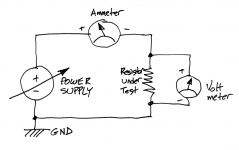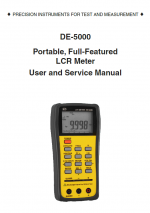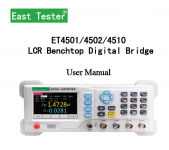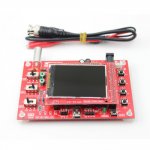I have 2 8050's. They have some very useful features for audio. I had to replace the batteries in both of mine. The battery option is rarer but handy. Downside is no autoranging. The accuracy is more than good enough for audio. The 8060 is a handheld variation that is more capable. Again, no autoranging but 4 1/2 digits with higher accuracy than many of their newer meters. If I could have only one meter that would be it.
Some newer meters are cluttered with features like a transistor tester and a cap test etc. They are not that useful in practice. A real transistor tester that gives good info can be had pretty cheaply today. Same for LCR meters with wider range etc. There is competition in the LCR tweezer market so you can get some great value in something that is hard to beat for SMD work.
Some newer meters are cluttered with features like a transistor tester and a cap test etc. They are not that useful in practice. A real transistor tester that gives good info can be had pretty cheaply today. Same for LCR meters with wider range etc. There is competition in the LCR tweezer market so you can get some great value in something that is hard to beat for SMD work.
Multimeter spreadsheet (80 manufacturers and over 400 meters listed) - Page 1 Way more info than you ever wanted.
Love Fluke multimeters as well as HP.
In order of accuracy
For the bench
--------------------------------------------------------------------------------------------------------------
HP34401A with 6.5 digit display, freq, dB, offset, 4Wire ohms.
On the bench & away
-------------------------------------------------------------------------------------------------------------
Fluke 289
Fluke 187
Fluke 867B
Fluke 179
Fluke 79
Have a handy battery powered Fluke 515A calibrator to check all my meters.
In order of accuracy
For the bench
--------------------------------------------------------------------------------------------------------------
HP34401A with 6.5 digit display, freq, dB, offset, 4Wire ohms.
On the bench & away
-------------------------------------------------------------------------------------------------------------
Fluke 289
Fluke 187
Fluke 867B
Fluke 179
Fluke 79
Have a handy battery powered Fluke 515A calibrator to check all my meters.
Worthwhile to have 4 wire resistance measurement if you use low value resistors, something with very good protection circuitry.
Also Mark Johnson mentioned 4 wire. What is the cheapest way to measure low value resistances accurately? I sometimes want to closely match 0.1 Ohm resistors for Papa's amps....
Probably should set the DC current in the resistors to the normal bias current in the amp.
Of course you can add additional series resistance if that works better with your particular
power supply. Some are touchy at low output voltages.
Measure the resistor DC voltage drops close to the body of the resistor.
Of course you can add additional series resistance if that works better with your particular
power supply. Some are touchy at low output voltages.
Measure the resistor DC voltage drops close to the body of the resistor.
Last edited:
If you are brave and self-reliant and confident you can use two Digital Multi Meters. Configure one of them as an ammeter and connect it in series with the device under test. Configure the other as a voltmeter and connect it directly to the leads of the resistor, as close to the resistor body as possible. Finally, connect this apparatus to a laboratory variable power supply, and slooooooowly dial it up until the ammeter reads exactly ISMART amperes. Then write down the voltmeter reading. Voila you have just measured the resistance of the device under test.
Rmeas = Vreading / ISMART
note: ISMART = SquareRoot( 0.2 * ResistorMaxRatedPower / ExpectedResistance)
I'm sure many readers here can explain how this apparatus uses Ohm's Law to perform the measurement.
_
Rmeas = Vreading / ISMART
note: ISMART = SquareRoot( 0.2 * ResistorMaxRatedPower / ExpectedResistance)
I'm sure many readers here can explain how this apparatus uses Ohm's Law to perform the measurement.
_
Attachments
For $72 this is a great value: High-Precision Resistance Tester Milliohm Meter Accurate With OLED USB Charging | eBay You should get a good reference to verify its accuracy. It reads out to 5 digits which is close to as good as you can get at those low values.
Also Mark Johnson mentioned 4 wire. What is the cheapest way to measure low value resistances accurately? I sometimes want to closely match 0.1 Ohm resistors for Papa's amps....
Any decent LCR meter with 4-wire connections and short compensation will measure milliOhms just fine, and will be useful for other things too.
Marco Reps video on the 30 year old HP3458. HP 3458A - Why is this 31 year old Multimeter UNRIVALLED? - YouTube
I was fortunate to get an HP3456A when the Dot-Com economy went bust, around $100. No such luck today. For every day use the Fluke 77 is used 60% of the time, and a set of Tektronix DM511's 40%
I was fortunate to get an HP3456A when the Dot-Com economy went bust, around $100. No such luck today. For every day use the Fluke 77 is used 60% of the time, and a set of Tektronix DM511's 40%
Is there such as thing for under $650?Any decent LCR meter with 4-wire connections and short compensation will measure milliOhms just fine, and will be useful for other things too.
The DER5000 has been the go to LCR meter for years: https://www.amazon.com/5000-Handhel...8XXBQMGZ&srpt=ELECTRIC_CIRCUIT_TESTING_DEVICE $130 at Amazon.
Demian, I've got a DE-5000 from DER-EE and I assure you it cannot make 4-terminal Kelvin measurements. All it has is DUT+, DUT-, and Guard.
On the other hand, I also own an ET4510 ($421 at AliExpress, $679 at Amazon) and that LCR meter DOES have four BNC jacks on the front panel for 4-terminal Kelvin measurements. They label the terminals (Hforce), (Hsense), (Lforce), (Lsense). The box includes the test leads with BNC and alligator clamp probes, along with the instrument and power cord.
_
On the other hand, I also own an ET4510 ($421 at AliExpress, $679 at Amazon) and that LCR meter DOES have four BNC jacks on the front panel for 4-terminal Kelvin measurements. They label the terminals (Hforce), (Hsense), (Lforce), (Lsense). The box includes the test leads with BNC and alligator clamp probes, along with the instrument and power cord.
_
Attachments
Last edited:
A longtime friend and customer (owner/mod of the Lecroy users group), who owns or had access to some high-end LCR/Z meters from GR and HP, bought one of these XJW-01 on a whim:
0.3% XJW01 Auto LCR Digital Bridge Resistance Capacitance Inductance ESR Meter | eBay
At that price I was skeptical. He took a selection of different LCR components and measured them on the XJW-01 and the high-end meters, and sent me the chart. I couldn't argue with the results, they were impressive. His quote:
"The thing to note on that spreadsheet is how close the meters track each other. I guess in reality we can thank Henry Parson Hall for that as they all use his measurement method in the designs."
As a bonus, the BNC's are spaced the same as test fixtures from HP, B+K, and others (22mm) so if you have any of them laying around you can use them with it. He also made up some pcb's which attach, with a fixture for measuring SMD parts, which I've encouraged him to offer for sale.
If I didn't already have several LCR meters on the bench I'd get one; at the price they're a no-brainer. Numerous vendors sell the XLW-01 with different accessories, so look around.
0.3% XJW01 Auto LCR Digital Bridge Resistance Capacitance Inductance ESR Meter | eBay
At that price I was skeptical. He took a selection of different LCR components and measured them on the XJW-01 and the high-end meters, and sent me the chart. I couldn't argue with the results, they were impressive. His quote:
"The thing to note on that spreadsheet is how close the meters track each other. I guess in reality we can thank Henry Parson Hall for that as they all use his measurement method in the designs."
As a bonus, the BNC's are spaced the same as test fixtures from HP, B+K, and others (22mm) so if you have any of them laying around you can use them with it. He also made up some pcb's which attach, with a fixture for measuring SMD parts, which I've encouraged him to offer for sale.
If I didn't already have several LCR meters on the bench I'd get one; at the price they're a no-brainer. Numerous vendors sell the XLW-01 with different accessories, so look around.
Last edited:
DSO138 2.4 inch TFT Handheld Pocket-size Digital Oscilloscope Kit DIY Parts Electronic Learning Set Soldered buy online at Low Price in India - ElectronicsComp.com
$11 or so without cell.
See the specs before laughing.
$11 or so without cell.
See the specs before laughing.
Attachments
- Home
- Design & Build
- Equipment & Tools
- What are the advantages of a bench top multimeter?



